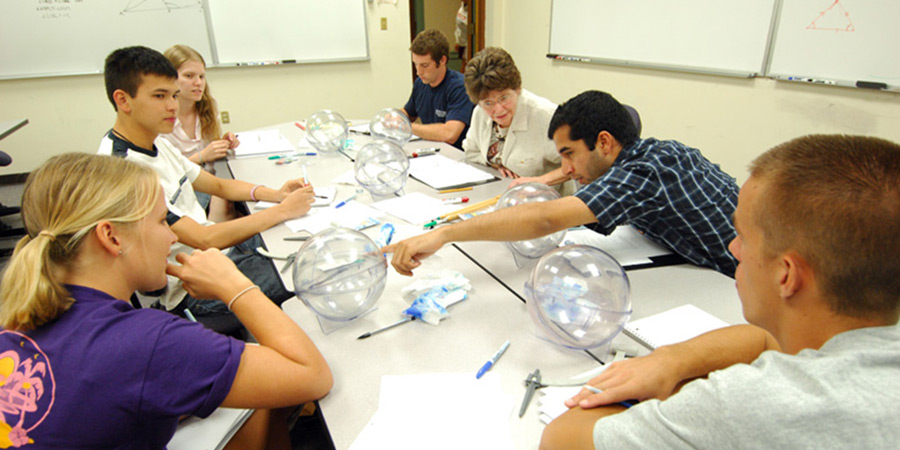Academics at Hanover:
Mathematics students at Hanover learn to reason through problems to find a solution, express ideas clearly and recognize relations among seemingly dissimilar situations. As a mathematics major, you will become a creative thinker who can analyze a wide range of situations. You will master the skill of simplifying the complex. With small class sizes and a dedicated faculty, Hanover also lets you follow your particular interests through internships and independent study programs.
DEPARTMENT WEBSITE
WHAT DO MATHEMATICS MAJORS STUDY?
- Calculus
- Logic, sets and relations
- Linear algebra
- Algebraic systems
- Probability and statistics
- Other topics that interest you, from the foundations of geometry to topology
MATHEMATICS PLACEMENTS
Previous graduates’ career and professional placements have included:
- Actuarial Analyst, CNA Insurance
- Financial Analyst, Eli Lilly & Co (Indianapolis)
- Programmer, Nims Associates
- Math Teacher, Farrington High School (Hawai’i)
- Systems Analyst, Fifth Third Bank
- Actuary, AON
- Technical Analyst, Sim2k
Graduate school placements have included:
- Carnegie Mellon University
- Purdue University
- University of Illinois
- Whittier Law School
- University of Iowa
- University of Cincinnati
- University of Kentucky
- Indiana University
Courses
Number
Name
Units
Description
MAT 101
Basic Mathematics for Science
.50
Students will develop mastery of basic mathematical skills and concepts, with a particular emphasis on those skills most needed for introductory science courses. Graded Pass/Fail. 0.5 unit. Not open to students with prior credit in MAT113 or MAT121 or above. Does not count toward the major or minor.
MAT 111
Calculus with Review I
1.00
A two-course sequence including a review of algebra, trigonometry, and analytic geometry integrated with an introduction to the theory of differential and integral calculus. Completion of 111 satisfies the Abstraction and Formal Reasoning LADR.
MAT 113
Essential Precalculus
1.00
A review of the precalculus topics which are essential for success in Calculus: inequalities; equations and their graphs; functions (polynomial, rational, trigonometric, exponential, and logarithmic). Includes an introduction to the concepts of limit, tangent line slope, and area beneath a curve. Does not count toward a major or minor in Mathematics. Prerequisite: MAT 101, placement at the Ready for Precalculus level, or concurrent enrollment in MAT
101.
MAT 121
Calculus I
1.00
An introduction to the theory of differential and integral calculus for functions of one variable. Includes the concepts of limit, continuity, derivatives, and indefinite integrals and definite integrals, culminating in the Fundamental Theorem of Calculus. Applications to related rates and optimization problems. Recommended: A strong background in algebra and trigonometry, or 113. Students are advised to take the departmental placement exam to assess their proficiency in algebra and trigonometry. Partially satisfies the SM CCR and satisfies the QL ACE. Prerequisite: MAT 113, or placement at the Ready for Calculus level
MAT 122
Calculus II
1.00
Differentiation and integration of logarithmic functions, exponential functions, and inverse trigonometric functions. Study of polar coordinates, conic sections, and various integration techniques. Applications to computations of volumes, surface areas, and centers of mass. Prerequisite: 121 or equivalent college course, or placement via departmental placement test. Partially satisfies the SM CCR and satisfies the QL ACE.
MAT 210
Math Topics for Liberal Arts
1.00
Non-technical introduction to selected concepts of modern mathematics (such as logic, set theory, axiomatic systems, non-Euclidean geometry, number theory, graph theory, etc.) that illustrate the nature of mathematics and its connections to other areas of knowledge. Does not count toward major or minor. Partially satisfies the SM CCR and satisfies the QL ACE.
MAT 212
Mathematics for Elementary Teachers
1.00
A study of mathematical concepts that are taught in elementary school, including problem solving, sets, numbers and their properties, operations on sets and numbers, geometry, measurements, probability and statistics .Includes a brief introduction to computer science and coding concepts. Does not count toward a major or minor in math. Partially satisfies the SM CCR. Prerequisite: EDU 221.
MAT 217
Applied Statistics
1.00
Use of graphs and numerical summaries to describe data from individual variables and to investigate relationships among variables. Design of statistical experiments. Survey of fundamental concepts of probability, including sampling distributions. Use of sample data to estimate, and to test hypotheses about, unknown parameters. Does not count toward major. No prerequisites. Partially satisfies the SM CCR and satisfies the QL ACE.
MAT 220
Logic, Sets and Relations
1.00
An introduction to the foundations of mathematics, with emphasis on developing basic reasoning skills needed for constructing proofs. Required for major. Counts toward minor but not in addition to Mat 243. Partially satisfies the SM CCR.
MAT 221
Calculus III
1.00
Differentiation and integration of vector-valued functions. Study of functions of several variables, including partial derivatives and multiple integrals. Detailed study of infinite sequences and series. Prerequisite: 122 or equivalent. Satisfies the Abstraction and Formal Reasoning LADR.
MAT 224
Linear Algebra
1.00
Systems of linear equations and their solutions. Study of the algebraic properties and applications of vectors, matrices, and linear transformations. Prerequisite: 121.
MAT 231
Differential Equations
1.00
Survey of basic techniques for describing dynamical systems by means of equations involving derivatives of functions, and of methods for finding functions which satisfy these equations. Prerequisite: 122.
MAT 243
Discrete Mathematics I
1.00
A survey of the math topics which are foundational to computer science: functions, relations, sets, basic logic, proof techniques, combinatorics, graphs and trees, discrete probability. Prerequisite MAT 101 MAT 113, MAT 121 (or above), or placement at the Ready for Precalculus level or above, or concurrent enrollment in MAT 101. Partially satisfies the SM CCR.
MAT 311
History of Mathematics
1.00
Survey of important discoveries in mathematics and the historical contexts in which they were made. Topics will include major mathematical developments beginning with the Ancient Greeks and tracing the development through Hindu, Arabic and European mathematics up to the modern developments of the 20th century. Prerequisite: 121 or permission.
MAT 320
Introduction to Number Theory
1.00
Explores properties of the integers such as divisibility and congruence, linear diophantine equations, prime numbers, the Fundamental Theorem of Arithmetic, Fermat’s little theorem, Euler’s Theorem, Euler’s phi function, computing powers and roots in modular arithmetic, and public key cryptography. Prerequisite: Mat 243 or 220.
MAT 324
Algebraic Systems
1.00
Study of concepts abstracted from algebraic properties of the classical number systems, including groups, rings, fields, order relations, and equivalence relations. Prerequisite: 220 or 243.
MAT 327
Probability & Statistics
1.00
Calculus-based survey, including axioms of probability, discrete and continuous random variables, standard probability functions (binomial, normal, Poisson, etc.), mathematical expectation, generating functions, and a brief introduction to estimation and hypothesis testing. Prerequisite: 122.
MAT 337
Statistical Modeling
1.00
A practical approach to statistical models and their use, including topics such as multiple regression, ANOVA and logistic regression. Emphasis is given to specifying appropriate models, using software to obtain model fits and to assess the quality of models, interpreting models, and presenting the results. Prerequisite: MAT 217 or MAT 327.
MAT 339
Foundations of Geometry
1.00
Survey of ancient, classical and modern views regarding the nature of space, the description of spatial structures and the organization of facts about space into deductive theories. Prerequisite: 121.
MAT 343
Discrete Mathematics II
1.00
Continues the discussion of discrete mathematics introduced in Mat 243. Topics include predicate logic, recurrence relations, graphs, trees, matrices, computational complexity, elementary computability and discrete probability. Prerequisite: 243 or 220.
MAT 437
Topics:Probability/Statistics
1.00
Content varies. Prerequisite: 327. Offered on demand.
MAT 461
Advanced Seminar
1.00
Student-led inquiry/research in an area of mathematics such as real or complex analysis, topology, algebra, etc. Content varies. May be repeated for credit. Prerequisite: Open to junior and senior math majors.







